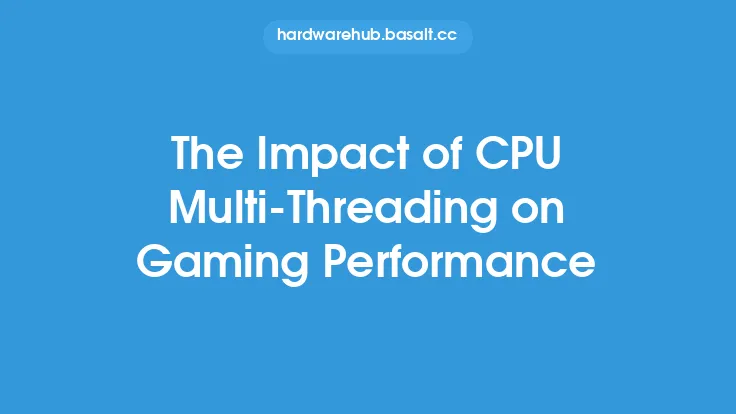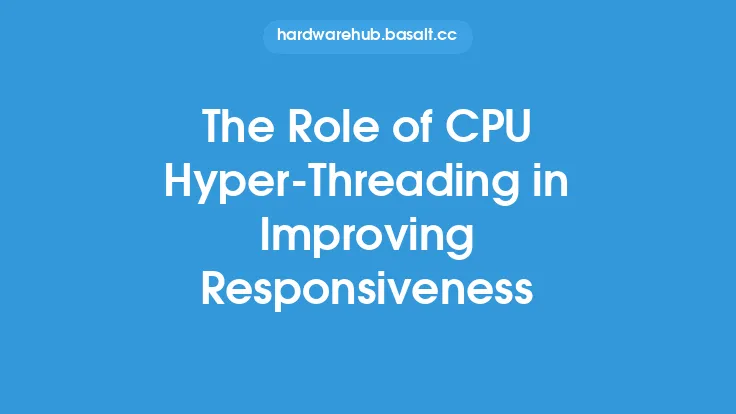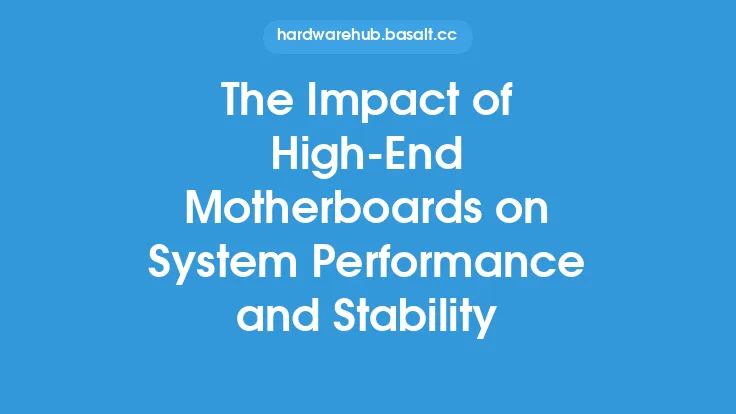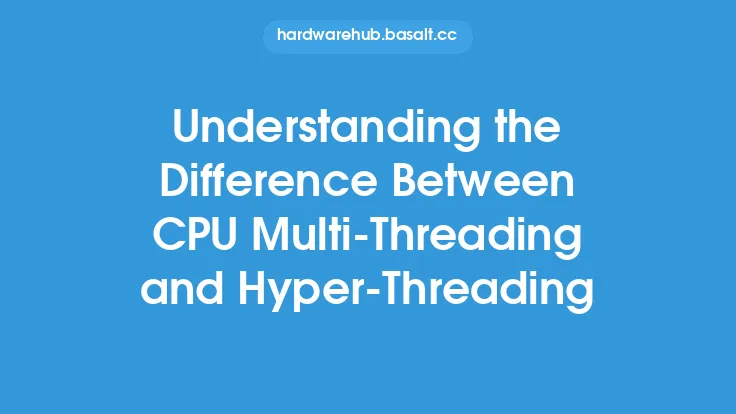The central processing unit (CPU) is a critical component of any gaming system, and its performance can significantly impact the overall gaming experience. One feature that has been widely adopted in modern CPUs is hyper-threading, which allows a single physical core to handle multiple threads of execution simultaneously. In this article, we will delve into the impact of CPU hyper-threading on gaming performance, exploring the benefits and limitations of this technology.
Introduction to Hyper-Threading
Hyper-threading is a technology developed by Intel that enables a single physical core to appear as multiple logical cores to the operating system. This allows the CPU to handle multiple threads of execution concurrently, improving overall system performance and responsiveness. In the context of gaming, hyper-threading can potentially improve performance by allowing the CPU to handle multiple tasks simultaneously, such as rendering graphics, handling physics, and processing audio.
How Hyper-Threading Affects Gaming Performance
The impact of hyper-threading on gaming performance is complex and depends on various factors, including the type of game, the CPU architecture, and the system configuration. In general, hyper-threading can improve gaming performance in several ways:
- Improved multitasking: Hyper-threading allows the CPU to handle multiple tasks simultaneously, which can improve overall system performance and responsiveness. In gaming, this can manifest as smoother gameplay, faster loading times, and improved overall system responsiveness.
- Increased thread-level parallelism: Hyper-threading enables the CPU to execute multiple threads of execution concurrently, which can improve performance in games that are heavily threaded. This can include games that use multiple cores to handle tasks such as physics, graphics rendering, and audio processing.
- Better utilization of CPU resources: Hyper-threading can help to improve the utilization of CPU resources, such as cache and execution units. By allowing multiple threads to share these resources, hyper-threading can help to reduce idle time and improve overall CPU efficiency.
Limitations of Hyper-Threading in Gaming
While hyper-threading can potentially improve gaming performance, there are several limitations to consider:
- Game engine optimization: Not all game engines are optimized to take advantage of hyper-threading. In some cases, the game engine may not be able to effectively utilize the additional threads provided by hyper-threading, which can limit the performance benefits.
- CPU architecture: The performance benefits of hyper-threading can vary depending on the CPU architecture. For example, some CPUs may have a higher number of physical cores, which can provide better performance than hyper-threading in certain scenarios.
- Thread synchronization overhead: Hyper-threading can introduce additional overhead due to thread synchronization, which can limit the performance benefits. This overhead can include the time spent on context switching, thread creation, and synchronization primitives.
Real-World Performance Analysis
To better understand the impact of hyper-threading on gaming performance, let's consider some real-world examples. In a study published by Intel, the company compared the performance of a CPU with hyper-threading enabled versus disabled in several popular games. The results showed that hyper-threading provided a significant performance boost in games that were heavily threaded, such as those using the Unreal Engine 4 game engine.
In another study published by Tom's Hardware, the website compared the performance of a CPU with hyper-threading enabled versus disabled in several games, including Assassin's Creed Odyssey and The Witcher 3. The results showed that hyper-threading provided a small but noticeable performance boost in both games, with the largest gains seen in Assassin's Creed Odyssey.
Conclusion
In conclusion, the impact of CPU hyper-threading on gaming performance is complex and depends on various factors, including the type of game, the CPU architecture, and the system configuration. While hyper-threading can potentially improve gaming performance by allowing the CPU to handle multiple tasks simultaneously, there are several limitations to consider, including game engine optimization, CPU architecture, and thread synchronization overhead. By understanding the benefits and limitations of hyper-threading, gamers can make informed decisions about their system configuration and optimize their gaming experience.
Future Developments and Trends
As the gaming industry continues to evolve, we can expect to see further developments in CPU hyper-threading technology. One area of research is the development of more efficient thread scheduling algorithms, which can help to reduce the overhead associated with thread synchronization. Another area of research is the development of more advanced CPU architectures, which can provide better support for hyper-threading and other forms of parallelism.
In the near future, we can expect to see the adoption of more advanced CPU architectures, such as those using 3D stacked processors and hybrid CPU architectures. These architectures can provide better support for hyper-threading and other forms of parallelism, which can help to improve gaming performance and overall system responsiveness.
Best Practices for Optimizing Hyper-Threading
To get the most out of hyper-threading in gaming, there are several best practices to consider:
- Choose a CPU with a high number of physical cores: While hyper-threading can provide a performance boost, a high number of physical cores can provide better performance in games that are heavily threaded.
- Optimize game engine settings: Many game engines provide settings that can be optimized for hyper-threading. By adjusting these settings, gamers can help to improve the performance benefits of hyper-threading.
- Monitor system resources: By monitoring system resources, such as CPU utilization and memory usage, gamers can help to identify bottlenecks and optimize their system configuration for better performance.
Final Thoughts
In final thoughts, the impact of CPU hyper-threading on gaming performance is a complex topic that depends on various factors, including the type of game, the CPU architecture, and the system configuration. By understanding the benefits and limitations of hyper-threading, gamers can make informed decisions about their system configuration and optimize their gaming experience. As the gaming industry continues to evolve, we can expect to see further developments in CPU hyper-threading technology, which can help to improve gaming performance and overall system responsiveness.





